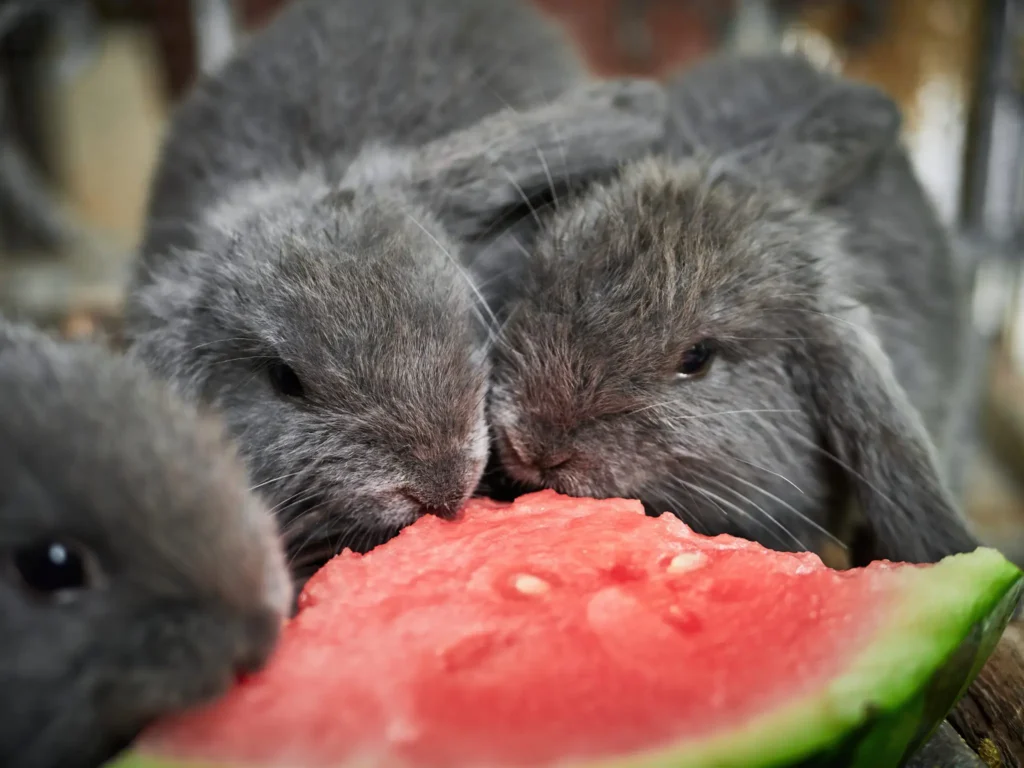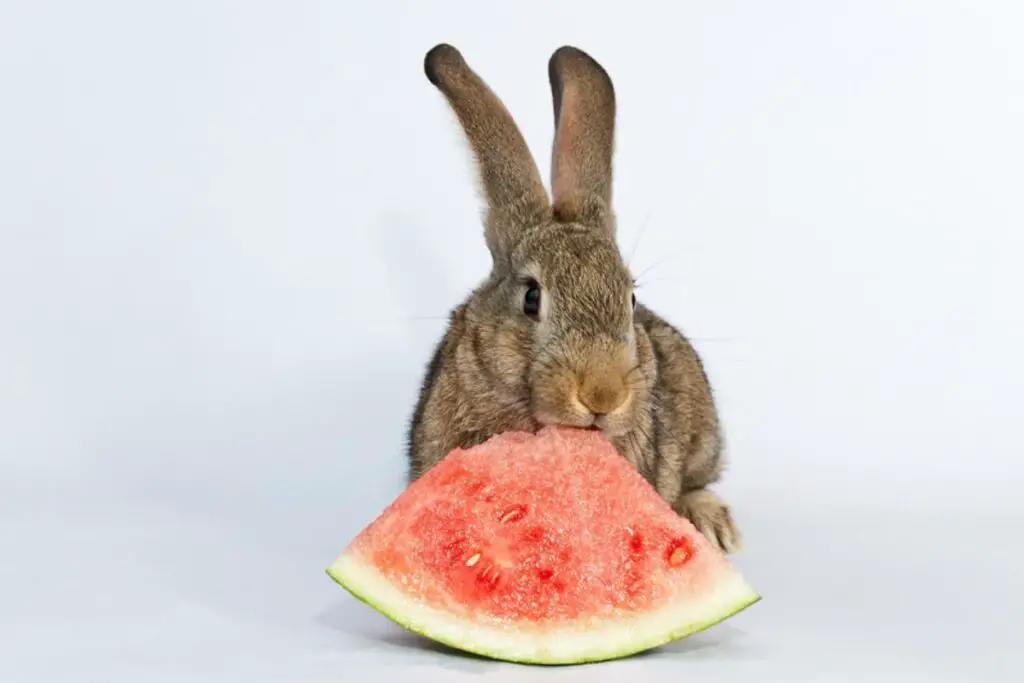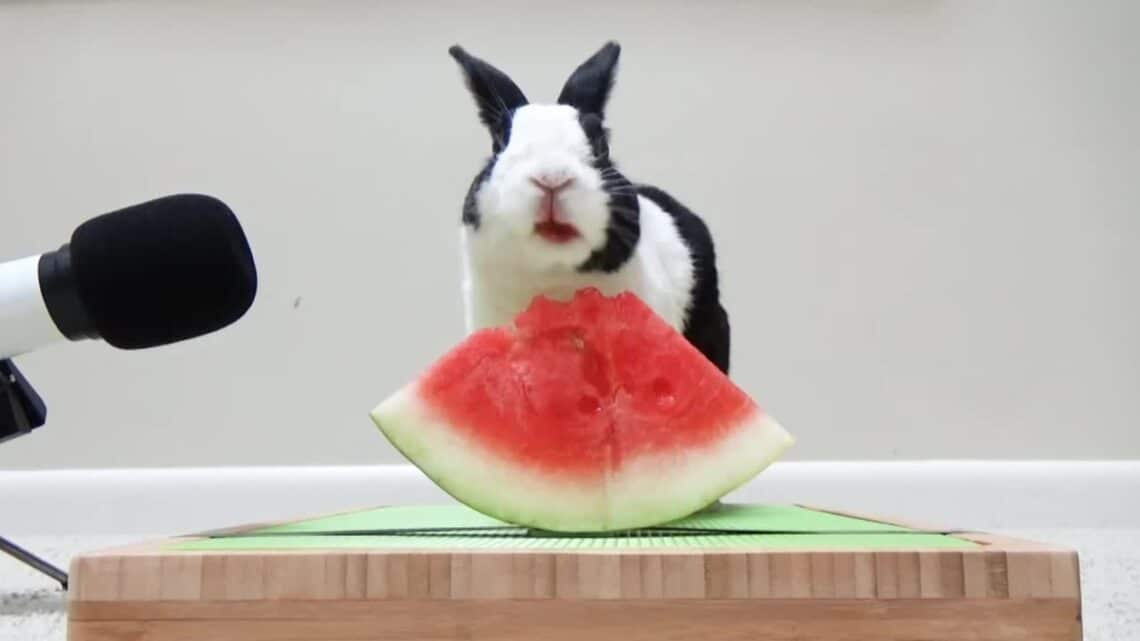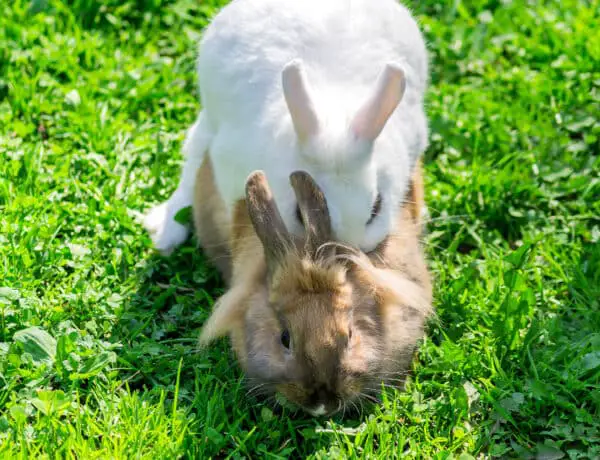Introduction
Can Rabbits Have Watermelon: The dietary needs of rabbits can be quite specific, and as responsible pet owners or enthusiasts, it’s essential to ensure that every aspect of their nutrition is taken into consideration. In this discussion, we will explore the suitability of watermelon as a treat for rabbits sleep, addressing questions such as its nutritional value, potential benefits, and risks associated with feeding rabbits this tempting fruit. Understanding whether rabbits can have watermelon and the appropriate way to offer it can contribute to the overall health and happiness of these beloved small animals. Rabbits are known for their herbivorous diet primarily consisting of hay, fresh vegetables, and some fruits. While their diet is centered around fibrous and leafy greens, the inclusion of fruits like watermelon can be a source of excitement and variation in their meals. However, the key lies in moderation and understanding the potential effects of watermelon consumption on these delicate creatures.
Watermelon is renowned for its high water content, making it an excellent way to keep rabbits hydrated during hot weather. Additionally, it offers essential vitamins and minerals such as vitamin C, vitamin A, and potassium. Despite these potential benefits, there are also considerations to keep in mind. Watermelon is relatively high in sugar, and too much sugar in a rabbit’s diet can lead to digestive problems, obesity, and other health issues. In this exploration of whether rabbits can have watermelon, we will examine the dos and don’ts of incorporating this treat into their diet, the appropriate serving sizes, and the precautions necessary to ensure that offering watermelon to rabbits is a safe and enjoyable experience for both you and your furry companion. So, let’s hop right into the world of watermelon and rabbits to discover how to make this sweet fruit a delightful part of their diet while prioritizing their well-being.
When considering whether rabbits can enjoy watermelon, it’s crucial to focus on the correct way to introduce this fruit into their diet. Begin by offering small, bite-sized portions of watermelon as an occasional treat, rather than a staple food item. Moderation is key, as the high sugar content can lead to gastrointestinal issues if over consumed. A couple of small cubes or slices a few times a month can be a delightful and safe treat for your furry friend. Remember that the rind and seeds of watermelon should be avoided when feeding rabbits. The rind can be tough to digest and may cause digestive discomfort, while the seeds, if ingested in large quantities, can potentially lead to intestinal blockages. Always remove these parts before offering watermelon to your rabbit. Observing your rabbit’s reaction to watermelon is essential. Some rabbits may enjoy it, while others may not be as interested.

How much watermelon can I give my bunny?
Feeding Your Rabbit Watermelon
Always ensure you feed watermelon to your rabbit in moderation. One to two servings a week of fresh watermelon is more than enough. Cut the watermelon you offer your bunny rabbit into small cubes that he can eat without too much mess or difficulty.
While watermelon can be a refreshing and hydrating treat, it’s important to remember that it’s relatively high in sugar. Feeding your rabbit too much sugar can lead to digestive problems, obesity, and other health issues. Therefore, moderation is crucial when it comes to offering watermelon to your bunny.
A general guideline is to offer small, bite-sized portions of watermelon as an occasional treat. One or two small cubes or slices of watermelon a few times a month can be sufficient to satisfy your rabbit’s taste buds without overloading them with sugar.
Before offering watermelon to your bunny, always remove the rind and seeds. The rind can be tough to digest and may cause digestive discomfort, while the seeds, if ingested in large quantities, can potentially lead to intestinal blockages. Removing these parts ensures that your rabbit enjoys the fruit safely.
Are bunnies allergic to watermelon?
Yes, your rabbit can have watermelon, but don’t leave them a huge slice! Rabbits can eat watermelon, but it should only be in moderation as watermelon is high in sugar. Treats like watermelon should be occasional additions to a rabbit’s primary diet, which should consist of hay, leafy greens, and high-fiber pellets.
One of the primary concerns when feeding watermelon to rabbits is its high sugar content. While rabbits can metabolize some sugar, excessive sugar intake can lead to digestive problems, obesity, and other health issues. Therefore, it’s crucial to offer watermelon in moderation and monitor your rabbit’s response.
When introducing watermelon to your bunny, start with a small, bite-sized portion. A tiny cube or a thin slice is usually sufficient. Gradually increase the amount if your rabbit tolerates it well, but always maintain moderation.
Before serving watermelon, be sure to remove the rind and seeds. The rind can be challenging for rabbits to digest, potentially leading to digestive discomfort. While a few small seeds are unlikely to cause harm, it’s best to remove them to prevent any issues.
What is the best fruit for rabbits?
Treats should be healthy foods too, and only given in very small amounts, such as when training (e.g. teaching your bunny to use the litter box). Good treats are small amounts of fruit such as strawberries, bananas, raspberries, pineapple pieces, apples without seeds, and melons.
Apples: Apples are a popular choice for rabbits. They are low in calories and provide essential vitamins and fiber. Remove the seeds and core before offering slices or small pieces to your bunny.
Bananas: Bananas are a tasty and nutritious treat for rabbits. They are rich in potassium and fiber. However, due to their high sugar content, bananas should also be given in moderation.
Berries: Rabbits can enjoy a variety of berries, such as strawberries, blueberries, and raspberries. These fruits are packed with antioxidants and vitamins. Offer them occasionally as a sweet and healthy treat.
Can rabbits eat tomato?
“A small acorn-size amount of seedless tomato per day is perfectly fine for a rabbit older than 12 weeks of age,” Henson said. So in general, tomatoes are an OK fruit to share with your rabbit, just as long as it’s a small amount and the flesh part of a seedless tomato only.
Tomatoes are a source of essential nutrients like vitamin C, vitamin K, and potassium. They also contain fiber, which can be beneficial for a rabbit’s digestive system. However, tomatoes are relatively high in sugar compared to many other vegetables, so they should be offered in moderation.
While the tomato fruit itself can be consumed by rabbits in small amounts, it’s crucial to avoid feeding them the leaves and stems of the tomato plant. These parts of the plant contain a substance called solanine, which can be toxic to rabbits.
Rabbits have sensitive digestive systems, and sudden dietary changes or overindulgence in any particular food can lead to gastrointestinal upset. If you decide to offer your rabbit tomatoes, start with a small amount to gauge their tolerance and observe any adverse reactions.
Like humans, rabbits can have individual sensitivities or allergies to specific foods. Even though tomatoes are generally safe for most rabbits when given in moderation, it’s essential to monitor your rabbit for any unusual reactions, such as digestive upset or changes in behavior.
Can bunnies eat cucumber?
Yes, it is safe for rabbits to eat cucumber! Most rabbits will love the fresh taste. Rabbits can also eat cucumber leaves. Before feeding cucumber to your rabbit, wash it in cold water to remove pesticides.
Cucumbers are low in calories and provide essential nutrients like vitamin K, vitamin C, potassium, and dietary fiber. Their high water content makes them a hydrating option for rabbits, especially during hot weather.
While cucumbers can be a healthy addition to a rabbit’s diet, it’s essential to offer them in moderation. Rabbits have sensitive digestive systems, and sudden dietary changes or overconsumption of any particular food can lead to gastrointestinal issues.
Before giving cucumbers to your bunny, make sure they are fresh and thoroughly washed to remove any pesticides or contaminants. You can offer cucumber slices or small pieces as a treat.
While the flesh of the cucumber is safe for rabbits to eat, it’s a good idea to remove the seeds and the tough skin. The skin can be harder to digest and may cause digestive discomfort if consumed in large quantities.
Can rabbits eat papaya?
Papaya fruit is safe for rabbits in limited quantities, and they will happily munch up a few slices of this fruit if they are on offer. However, you should scrape the seeds out of the fruit before giving it to your rabbit, as they could present a choking hazard.
Papaya is a rich source of essential vitamins and minerals, including vitamin C, vitamin A, vitamin E, and folate. It also contains dietary fiber, which can be beneficial for a rabbit’s digestive system. The natural sugars in papaya can provide a sweet and enjoyable treat for your bunny.
While papaya can be a healthy addition to a rabbit’s diet, it should be offered in moderation. Rabbits have sensitive digestive systems, and excessive consumption of any fruit, including papaya, can lead to digestive upset or obesity.
Always serve fresh, ripe papaya to your rabbit. Overripe papaya can become mushy and less appealing to your pet. Thoroughly wash the fruit to remove any pesticides or contaminants before offering it to your rabbit.
When introducing papaya to your rabbit’s diet, start with a small amount to gauge their tolerance. Offer a small piece or a few small cubes as an occasional treat. Be observant of your rabbit’s reaction to ensure they handle it well.
What Colour is rabbit urine?
Normal rabbit urine will vary from a pale yellow or clear colour, through various orange and brown colours, right up to a deep red colour. Rabbit urine may also look cloudy due to the presence of calcium carbonate being excreted within the urine.
The most common color of rabbit urine is a pale yellow to bright yellow. This is considered normal and indicates that your rabbit is well-hydrated and their kidneys are functioning correctly. Rabbit urine can sometimes appear slightly cloudy, which is also generally harmless.
Urine that is a slightly darker yellow or amber may suggest that your rabbit is becoming slightly dehydrated. Ensure that your rabbit has constant access to fresh, clean water to help maintain proper hydration levels.
If you notice red or pink urine, it can be a cause for concern. While some medications or foods with natural pigments (such as beets) can temporarily discolor urine, red or pink urine in rabbits is often a sign of blood in the urine, which could be indicative of a urinary tract infection or other health issues. If you observe this color consistently, consult your veterinarian for a thorough examination.
What are rabbits favorite vegetables?
“Carrots should be fed sparingly, as they are very high in carbohydrate and may upset GI bacterial flora.” Particularly good vegetables include the dark leafy greens like romaine lettuce, bok choy, mustard greens, carrot tops, cilantro, watercress, basil, kohlrabi, beet greens, broccoli greens, and cilantro.
Bell Peppers
Bell peppers, especially the red and green varieties, are often enjoyed by rabbits. They provide vitamin C and a satisfying crunch.
Broccoli Leaves and Stalks
While not all rabbits may enjoy broccoli, some are quite fond of it, particularly the leaves and stalks. It’s a good source of vitamins and fiber.
Celery
Celery is a low-calorie vegetable that rabbits may find appealing. It can be a refreshing and hydrating addition to their diet.
Cucumber
Cucumber slices, especially during hot weather, can be a cooling and hydrating treat for rabbits. Remove the seeds and skin before offering.

Conclusion
The high sugar content of watermelon makes it essential to prevent overindulgence, as excessive sugar intake can lead to various health issues in rabbits, including digestive problems and obesity. When providing watermelon to your rabbit, always remove the rind and seeds to prevent potential digestive complications. Pay close attention to your rabbit’s reaction and monitor for any adverse effects. Not all rabbits may enjoy or tolerate watermelon, so individual preferences and sensitivities must be considered. To ensure the overall well-being of your rabbit, it’s advisable to consult with a veterinarian or seek guidance from experienced rabbit owners regarding the appropriate way to include watermelon in their diet. With the right precautions and mindful feeding practices, watermelon can be a delightful and safe occasional treat that adds variety to your rabbit’s diet while keeping them happily hydrated during hot weather. Watermelon, with its enticing sweetness and high water content, can be a refreshing addition to a rabbit’s diet when approached with care and knowledge.
Remember that while watermelon offers some nutritional benefits, its sugar content should be closely monitored. Feeding rabbits this fruit should be an occasional indulgence rather than a regular occurrence. Always remove the rind and seeds, and observe your rabbit’s response to ensure it agrees with their digestive system. Furthermore, it’s essential to consider each rabbit’s unique dietary needs and preferences. What may be suitable for one rabbit may not be for another. Seek advice from a veterinarian or experienced rabbit owners for tailored guidance on integrating watermelon or any other treats into your rabbit’s diet. Ultimately, responsible rabbit ownership involves maintaining a well-balanced and nutritious diet for your furry friend. While watermelon can be a fun and tasty treat, it should be just one component of a diverse and appropriate rabbit diet, centered around hay and fresh vegetables. By prioritizing your rabbit’s health and well-being, you can ensure they enjoy a happy and fulfilling life as part of your family.
Understanding the nutritional content of watermelon, particularly its sugar levels, is vital. Too much sugar can disrupt a rabbit’s digestive system and lead to health issues. Therefore, serving watermelon in moderation is crucial to safeguard your rabbit’s health. Always remove the rind and seeds, and introduce this fruit slowly into their diet. Moreover, it’s essential to recognize that each rabbit is unique in terms of their preferences and tolerances. Some may relish watermelon, while others might not show interest. Pay attention to your rabbit’s cues and adjust accordingly to ensure their comfort and enjoyment. Consulting with a knowledgeable veterinarian or experienced rabbit owners can provide invaluable insights into the dietary needs of your specific rabbit. They can help you devise a well-rounded and nutritious diet plan that includes treats like watermelon without compromising their health.





No Comments